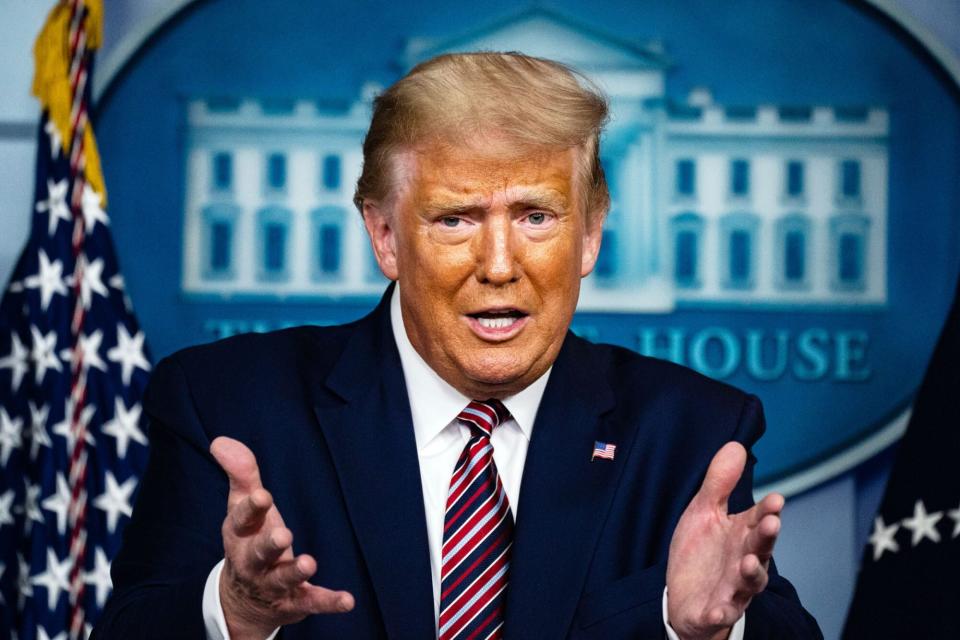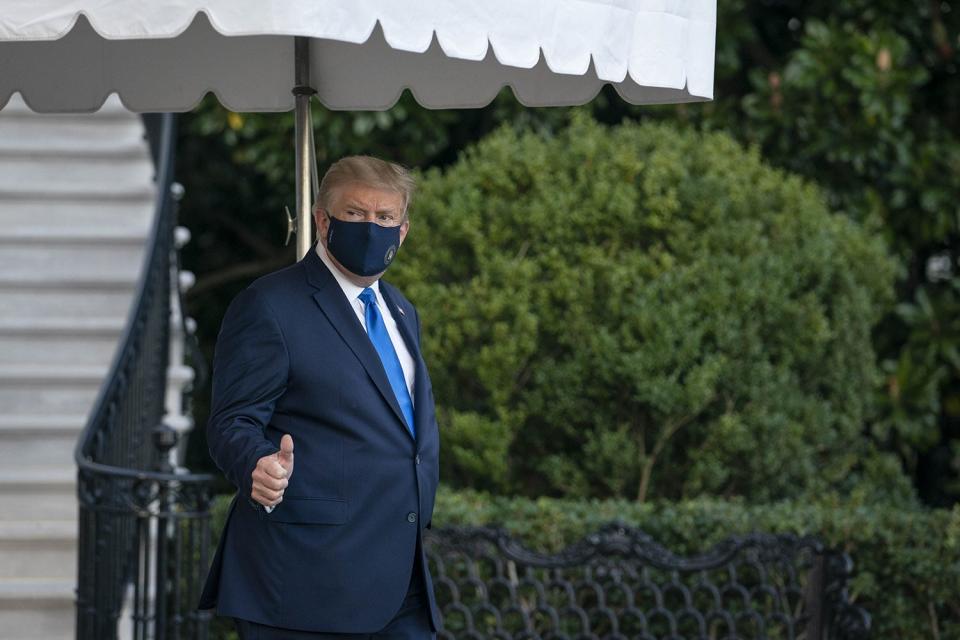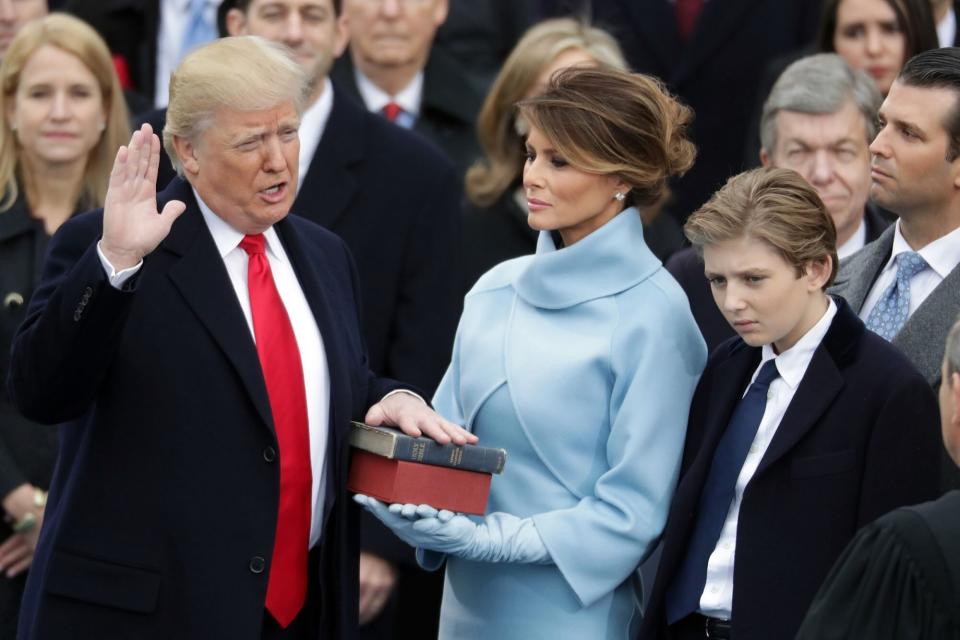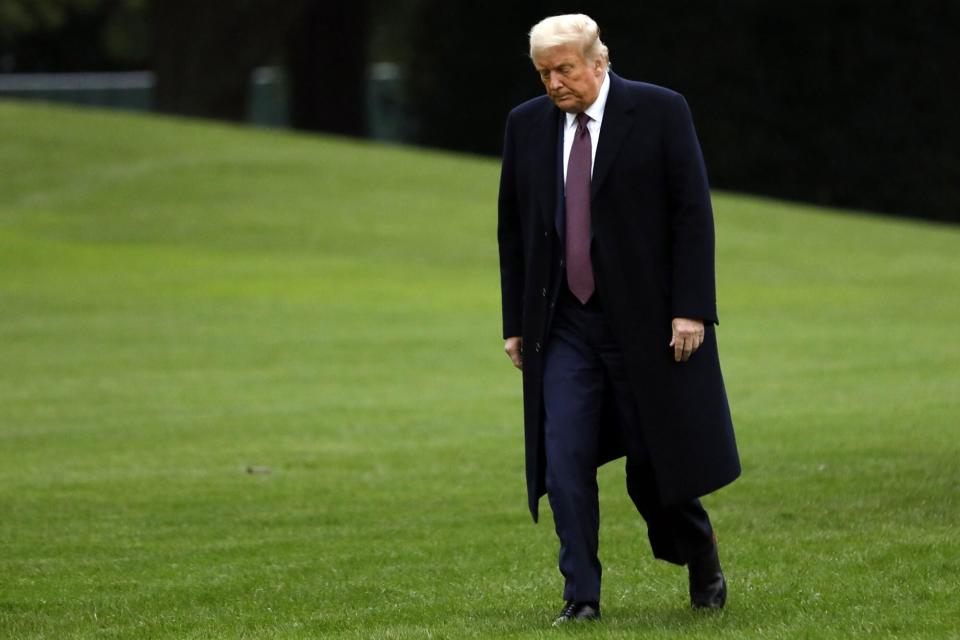Concerns About Presidential Succession: Who Is on Ballot If President Donald Trump's Health Worsens

Salwan Georges/The Washington Post via Getty President Donald Trump
A lot of questions are still to be answered about President Donald Trump’s positive COVID-19 status. And while Trump was said to have mild symptoms of the deadly coronavirus -- he entered Walter Reed Hospital on Friday -- his age and several pre-existing conditions, including weight, gender and a history of a mild heart condition, put him at a higher risk of becoming severely ill.
Douglas Brinkley, a presidential scholar and Rice University professor of history, tells PEOPLE that not since President Ronald Reagan was shot in 1981 has there been such a threat to the health of a president.
"When Reagan was rushed to George Washington hospital, there's this weird moment where secretary of state Alexander Haig went to the microphones and said, 'I'm in charge,' and it created a lot of consternation," says Brinkley. "Once Ronald Regan got healthy, he fired him."
But the 25th amendment of the Constitution, passed in the 1960s, sheds light on what happens if Trump is incapacitated or dies, and allows for a president to temporarily pass the power of the presidency over to his vice president.

Sarah Silbiger/EPA-EFE/Shutterstock Donald Trump
A few years after Reagan was shot, he needed sedation for an operation and temporarily transferred power to his vice president, George H.W. Bush. And when the younger President George W. Bush underwent several colonoscopies, "(vice president) Dick Cheney was ostensibly in charge," says Brinkley.
"What our country's never been stricken with," he adds, "is a president and vice president being knocked out at the same time." (Vice president Mike Pence has so far tested negative for the coronavirus.)
In theory, John Fortier, director of governmental studies at the Bipartisan Policy Center, tells PEOPLE that succession of the presidency "would go down the line" from the president to vice president, then speaker of the house.
But it's not so simple. After the vice president, "there becomes a debate, whether it should be the speaker of the house of representatives or the secretary of state," says Brinkley. "And so you would think we would have a clearer indication of what would occur, meaning an automatic line of succession, but there's this vagueness lingering."
"I would say [Pelosi] would be the next in line," he continues, "but you're going to have a situation where maybe Donald Trump writes a letter that says, 'I want Mike Pompeo if something happened to me' it could get thrown into the court; the language of these amendments need to be clarified."
And what happens if Trump becomes so ill that he cannot do his job but won't admit it?
"That happened with Woodrow Wilson," says Brinkley. "Wilson got the Spanish flu, he got very ill in Paris and later suffered a stroke.
"And his wife kept it secret from the public and was making decisions for him. So you could suddenly see Melania making the decisions for Donald Trump by saying here's what my husband said or here's what he might do," says Brinkley. "That's a situation that seems remote."

Chip Somodevilla/Getty
If Trump insists he is okay but incapable of doing his job, "there is a very high hurdle" to remove him, says Fortier. The vice president and a majority of the cabinet must call for the president's removal and two-thirds of Congress must vote to not let him return.
Neither Brinkley nor Fortier, who was the former executive director of the Continuity of Government Commission, can recall a president being so sick so close to an election. And if one of the two candidates dies or is incapacitated, does he need to be replaced on the ballot? Basically, either the Democratic National Committee or the Republican National Committee can come up with a replacement.
"The ballots have been printed, and they've been sent out and some people have actually cast their ballot," says Fortier. "In the case of a president, what's interesting is we are not really electing the president when we vote on the ballot in November, we are voting for these electors in the electoral college.
"You could still, as a Republican, go to the polls and vote for the Donald Trump-Mike Pence ticket," he continues, "and know that those electors are going to be there to vote for Mike Pence, Marco Rubio, or whoever on the ticket the Republicans came up as the replacement."
Fortier adds, "So even though it's confusing, perhaps there is some way in which the party could tell or at least persuade these electors to all stick together with the new replacements in December and they are very likely to go along and it would work out."

Yuri Gripas/POOL/EPA-EFE/Shutterstock President Donald Trump returns from Bedminster, New Jersey, on Thursday.
Dec. 14 would be the day the electors meet in each state and cast their ballots for president and vice president.
"Other scenarios make it a little trickier," says Fortier. "So the same thing is actually true if just after the election, somebody were killed or both were killed -- and I thought about this after 9/11 -- the party could still pick a replacement and tell the presidential electors on Dec. 14 to vote for these new people, even if they've never been on the ballot."
Another scenario, he says, is electors in some states not voting for the candidate chosen by their party to replace the late candidate and supporting another candidate. "In the case of the death of one of the candidates, it might make it more difficult to figure out what to do," he says. "These people might not be able to vote for the replacement in the way that the party would have them."
While there are "still a lot of mysteries out there," says Brinkley, "I think that this is a time for us to work to create a clear presidential line of succession if something ever happened to the president and vice president."

 Yahoo Finance
Yahoo Finance 